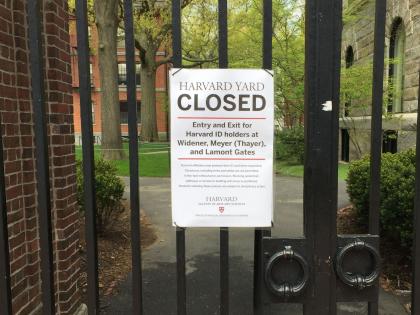Last April 27, toward the end of an academic year when protests about racial inequity and inclusion disrupted routines on many campuses, especially his own, Yale president Peter Salovey announced, “The name of Calhoun College will remain.” His letter to the community noted that the undergraduate residence, established in 1932, commemorates 1804 graduate John C. Calhoun, “who, while serving as a member of the House of Representatives, senator, and vice president of the United States, was a prominent advocate for and defender of the repugnant institution of slavery.” He maintained that Yale should, and would, confront this odious past.
On August 1, Salovey announced formation of a Committee to Establish Principles on Renaming. Referring to Calhoun, he observed that “many faculty, students, alumni, and staff have raised significant and moving concerns about that decision, and it is now clear to me that the community-wide conversation about these issues could have drawn more effectively on campus expertise,” informed in part by “guiding principles” of the kind the new committee will produce.
Institutions find it no easier than individuals to make such pivots, lest they be perceived as weak. Perhaps Salovey, a psychologist who helped develop the concept of emotional intelligence, is unusually equipped to overcome such concerns. Perhaps he found the evidence, passions, and/or politics compelling. (The Yale Daily News reported that hundreds of faculty members had signed letters urging reconsideration of the April decision; in an open letter to Salovey, Coe professor of American studies and history and professor of African American studies Matthew Frye Jacobson asked, “Have you ever reflected on how it might feel to…be assigned to a residential college named for Joseph Goebbels?”)
Whatever the rationale, the effect of Salovey’s revision merits attention within communities dedicated to considering evidence and progressing toward truth. In this case, citing significant concerns and broader expertise bearing on the matter at hand, he has reopened a decision. That would seem to be a salutary way of modeling academic conduct, even if doing so comes at a real cost.
Hindsight, of course, is cheap. But one wonders about opportunities for productive do-overs in the Crimson context.
In the three-plus years that the Harvard Corporation and advocates of divesting endowment investments in fossil-fuel producers have crossed swords, the economics of oil and natural-gas production have been transformed by falling prices; solar cells have plunged in cost—but now compete with cheaper fossil fuels; and MIT, which also declined to divest, has promulgated a research agenda on energy and climate change (see “A Modest Proposal,” January-February). As the world has changed, the arguments for each position have simply been repeated, without visibly advancing a Harvard clean-fuel agenda; and the community remains no more notably enlightened or engaged in what this University is and ought to be doing. Might a different course yield something better than more intellectual dry holes?
Or consider the College’s decision, announced during exams last May, to impose sanctions on members of single-gender social organizations—prominently including the final clubs. It became apparent that the policy may impose collateral damage: to newer organizations serving undergraduate women and, more broadly, to the principle of free association (see harvardmag.com/free-association-16). As at Yale, the issue may prompt broader discussion in the Faculty of Arts and Sciences in the form of a debate on aspects of academic freedom: far from the issue the sanctions sought to address. How that debate unfolds may depend on whether the air is cleared first.







